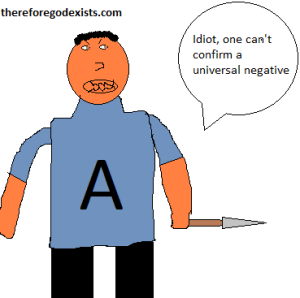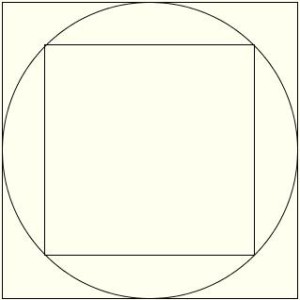 In an attempt to avoid providing evidence that God does not exist, atheists will sometimes say that it is impossible to prove a null hypothesis, or a universal negative. A universal negative is a claim that denies all members of a particular set, such as, “there is no God,” or “there is no Santa Claus,” and this is the type of claim that atheists maintain are impossible to prove. Therefore, since the non-existence of God falls in this catery, proving it or providing evidence for it can be taken as absurd. Is that the case? Is it possible to prove a universal negative?
In an attempt to avoid providing evidence that God does not exist, atheists will sometimes say that it is impossible to prove a null hypothesis, or a universal negative. A universal negative is a claim that denies all members of a particular set, such as, “there is no God,” or “there is no Santa Claus,” and this is the type of claim that atheists maintain are impossible to prove. Therefore, since the non-existence of God falls in this catery, proving it or providing evidence for it can be taken as absurd. Is that the case? Is it possible to prove a universal negative?
If it is the case that it is impossible to prove a universal negative, then it would follow necessarily that all of the arguments against the existence of God, fail. The problem of evil, the absence of evidence, who created God, bad design; all of them, can be categorically dismissed. If it is impossible to prove a universal negative, and these arguments attempt to prove a universal negative, it cannot be evaded that all of these arguments fail.
Which, ironically, will often serve as a self-defeater for many atheists that I have encountered, because typically they are willing to appeal to the problem of evil, while out of the other side of their mouth, assert that it is impossible to prove a universal negative. Perhaps the most obvious example of this would be Richard Dawkins, in that he, as well, claims that it is impossible to prove a universal negative, while attempting to reason to the conclusion that God almost certainly does not exist.
Take care to note that this is not the claim that because we cannot disprove God, that therefore God exists. But rather it is a response to the claim that we cannot prove a universal negative; the existence of God is as logically falsifiable as anything, and therefore I argue that those who claim that there is no God bear a burden of proof.
Is It Possible To Prove A Universal Negative?
 I think where atheists are often confused is that sometimes in science, it is functionally impossible to prove certain universal negatives, such as, “there are no fish with wings,” and they mistakenly conflate that scientific principle of functionality with the the philosophical ability to prove a universal negative. Obviously it is logically possible for one to prove something about every fish. We would have to catch every fish, even though it may not be functionally possible.
I think where atheists are often confused is that sometimes in science, it is functionally impossible to prove certain universal negatives, such as, “there are no fish with wings,” and they mistakenly conflate that scientific principle of functionality with the the philosophical ability to prove a universal negative. Obviously it is logically possible for one to prove something about every fish. We would have to catch every fish, even though it may not be functionally possible.
However there are certain universal negatives that are functionally possible to prove, for example I would be able to prove that there are no Muslims in my house. Atheists are usually not aware of how simple a universal negative can be; it is not some abstract thing that only applies to the existence of figures, but rather a universal negative is a proposition that denies something of all members of a class, whether that be existence, possessing wings, or living in my house. I deny that any members of the class of Muslims live in my house.
But there are even more obvious examples than this. If we can show that some object is self-contradictory, as the atheist philosopher Doctor John Shook explains, then we can know that it does not exist. A square circle, for example, does not exist; there is no figure that possesses both the traits of a square and a circle. They are at odds, and therefore no figure such as a square circle exists.
So is it possible to prove a universal negative? It is trivially easy, and indeed this same type of thinking can be applied to God. If God were shown to have traits that contradicted each other, it would follow that God does not exist (which happens to be one of my arguments against the Islamic conception of God). Further, if we were to show that there were some action that God would necessarily take that would be evident to us, and he did not take it, it could be shown that God did not exist.
Therefore I think it is very clear that it is possible to prove that some things do not exist, and indeed it is even possible to prove that God does not exist (even though nobody has been able to come up with a good argument).
If It Is Impossible, Atheists Should Be More Modest
Suppose it were impossible to prove that God did not exist. If that were the case, then atheists should never go around saying things such as there is no God, or God is a myth, or nature is all that exists. These are claims that go beyond the boundaries of what they admit that they can prove. If you are to say that there is no such being as God, by your own admission, you are making a leap of faith because you are believing something that you believe is impossible to demonstrate by logical or evidential means.
Thus atheists who believe that it is impossible to prove a negative should make very modest claims, such as, “I am not convinced by your arguments,” but if they claim that there is no God, they should be prepared to handle that claim from a logical angle. Alas as they freely admit, they are not.
Indeed I might go as far as to say that the idea that it is impossible to prove a universal negative would be a good thing for theists. The only evidence that could possible exist would be on the side of theism, and there could be absolutely no evidence for the belief that God does not exist. If this were true, I would defend it, as a rebuttal against other atheistic arguments. But of course it is not true, because it is trivially easy to prove a universal negative.
If you would like to discuss this further come join our Theology Discussion Group
As for proving a universal negative :
//However there are certain universal negatives that are functionally possible to prove, for example I would be able to prove that there are no Muslims in my house.//
Sure, but could you prove there are no invisible, inaudible and undetectable Muslims in your house?
No, you couldn’t – and this is pretty much the same as trying to disprove the existence of an invisible, inaudible and undetectable God.
You slipped up there!